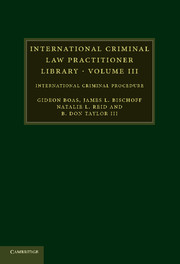Book contents
- Frontmatter
- Contents
- Foreword
- Table of authorities
- Table of short forms
- 1 The nature of international criminal procedure
- 2 Creation and amendment of rules of international criminal procedure
- 3 Procedures related to primacy and complementarity
- 4 Investigations, rights of suspects, and detention
- 5 Defence counsel, amici curiae, and the different forms of representation of accused
- 6 Pre-trial proceedings
- 7 Trial proceedings
- 8 The role and status of victims in international criminal procedure
- 9 Evidence
- 10 Judgement and sentencing
- 11 Appeal and revision
- 12 Conclusion
- Index
- References
1 - The nature of international criminal procedure
Published online by Cambridge University Press: 05 August 2011
- Frontmatter
- Contents
- Foreword
- Table of authorities
- Table of short forms
- 1 The nature of international criminal procedure
- 2 Creation and amendment of rules of international criminal procedure
- 3 Procedures related to primacy and complementarity
- 4 Investigations, rights of suspects, and detention
- 5 Defence counsel, amici curiae, and the different forms of representation of accused
- 6 Pre-trial proceedings
- 7 Trial proceedings
- 8 The role and status of victims in international criminal procedure
- 9 Evidence
- 10 Judgement and sentencing
- 11 Appeal and revision
- 12 Conclusion
- Index
- References
Summary
Few today would dispute the existence of substantive international criminal law and its legitimacy under international law. With some noteworthy exceptions, it is well accepted that the core categories of crimes, their underlying offences, and the forms of responsibility listed in the statutes of the international and internationalised criminal courts and tribunals (collectively, ‘international criminal tribunals’) are established in customary international law, treaty law or general principles of international law. The same cannot be said, however, for the procedural rules that govern the conduct of international criminal proceedings. Despite fifteen years of procedural activity at the international criminal tribunals, generating far more jurisprudence on matters of procedure than on substantive law, considerable scepticism remains about the legitimacy of international criminal procedure as a body of international law in its own right.
This third volume of the International Criminal Law Practitioner Library Series presents international criminal procedure as a comprehensive and coherent body by describing and explaining the framework within which substantive international criminal law is developed and applied at the tribunals. The first three chapters look at the infrastructure of the international criminal tribunals, including the sources of rules of international criminal procedure and the tribunals' relationship with national courts. The remaining chapters examine the key procedures as defined and elaborated in the governing instruments and jurisprudence of the international criminal tribunals, including those relating to investigations, detention, assignment of defence counsel and self-representation, the pre-trial and trial processes, victim participation, evidence, judgement, sentencing, and appeal.
- Type
- Chapter
- Information
- International Criminal Law Practitioner LibraryInternational Criminal Procedure, pp. 1 - 20Publisher: Cambridge University PressPrint publication year: 2011

